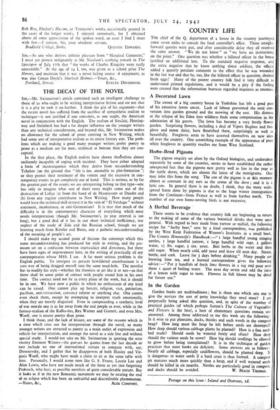THE DECAY OF THE NOVEL
SIR,—Mr. Swinnerton's article contained such an intelligent challenge to those of us who ought to be writing interpretative fiction and are not that it is a pity he took it no further. I think the gist of his argument—that the recent novel has suffered from the sacrifice of sympathetic realism to technique—is not justified if one considers, as one ought, the American novel in conjunction with the English. The realism of Sinclair, Heming- way and Steinbeck has had a far deeper influence on the younger writers than any technical consideration, and beyond this, Mr. Swinnerton makes no allowance for the school of prose centring in New Writing, which had some sort of interpretative realism as its entire literary aim. The prob- lems which arc making a good many younger writers prefer poetry to prose as a medium are far MOP: technical at bottom than they are con- ceptual.
In the first place, the English realists have shown themselves almost uniformly incapable of coping with incident. They have either adopted a form of inconsequence which they derive from misunderstanding Tchekov (on the ground that " life is not amenable to plot-formation ") or they permit their treatment of the violent and the excessive in con- temporary events to get completely out of hand. This is serious, as by far the greatest part of the events we are interpreting belong to that type—one has only to imagine what sort of short story might come out of the destruction of Lidice (a) from the hand of de Maupassant or Daudet and (b) from any regular contributor to New Writing. How many people would have the technical skill to treat it in the vein of " El Verdugo " without sentiment, incoherence, or anti-Germanism? It is true that much of the difficulty is in the contemporary character of everything which most needs interpretation (though Mr. Swinnerton's 5o year interval is too long), but a good deal of it lies in our sheer technical inefficiency, our neglect of the study of Zola and the Russian school, though we are learning much from KOstler and Barea, ana a pathetic misunderstanding of the meaning of people's art.
I should make my second point of friction the contempt which this same misunderstanding has produced for style in writing, and the pre- mium set on a confusion between inarticulacy and directness, but there have been signs of improvement here, in the writing of practically all my contemporaries whose MSS. I see. A far more serious problem is the English public. To interpret its present bewildered unenthusiasm is a sure way of being dragged oneself into the same mud-hole. The novelist has to modify his style—whether the theorists of art like it or not—so that there shall be some point of contact with people round him in his own time. The contact need not be in every plane of the work, but it should be in one. We have now a public in which no enthusiasm of any kind can be raised. One cannot play up beauty, religion, vice, patriotism, pacifism, anti-vivisection, currency reform or anything else. One cannot even shock them, except by attempting to interpret truth emotionally, when they are merely disgusted. Even in compounding a synthetic level of war morale one is as far away from the real people as ever, while in the fantasy-realism of the Kafka-ites, Rex Warner and Garnett, and even Mrs. Woolf, one is nearer poetry than prose.
I think those, and the lack of leisure, are some of the reasons which in a time which cries out for interpretation through the novel, so many younger writers are attracted to poetry as a main outlet of expression and vehicle for interpretation, and attempt the novel as a side line and without special study. I would not take on Mr. Swinnerton in spotting the next twenty Eminent Writers—the guesses he quotes from the last decade or two include no one of international stature to compare with, say, Dostoievsky, and I gather that he disapproves of both Huxley and Vir- ginia Woolf, who might have made a claim to sit at the same table with him. Personally, I would name men like G. S. Fraser, Laurie Lee and Alun Lewis, who have not made much of the form as yet (not forgetting Prokosch, who has), as possible novelists of quite considerable stature. But it looks as if in the new Romantic movement we may be nearing the end of an eclipse which has been an unfruitful and discreditable phenomenon.


























 Previous page
Previous page